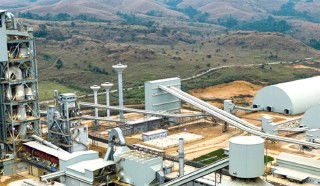This week, Dangote Cement commissioned a new 3Mta grinding plant in Attingué, Côte d'Ivoire, marking a significant milestone for the country's cement industry. The new facility expands the country's capacity by almost 16 percent and brings Ivory Coast's total capacity to around 18.85 Mta. The facility is located 30 km from Abidjan on a 50 hectare site and is the largest in the country. It corresponds to the two 1.5 Mta plants of the Atlantic Group and the 2.7 Mta plant of the Cim Metal Group in Abidjan.
The new work will cost approximately $160 million and require ten years of development. It is expected to create around 1,000 direct and indirect jobs. With this launch, Côte d'Ivoire becomes the 11th African country to host a Dangote operation, bringing the group's total cement capacity to 55 Mta.
Self-sufficiency drive
The project comes at a time of increasing domestic demand, driven by major infrastructure and road projects. According to the Global Cement Report Imports are expected to decline from an estimated 5.27 million tonnes in 2024. Algeria, Turkey and Egypt are the countries of origin of most clinker imports. Dangote's new plant will eliminate the company's need for imports from Nigeria, thereby improving self-sufficiency.
Serge Gbotta, CEO of Dangote Cement Côte d'Ivoire, described the Attingué plant as “a symbol of confidence in the future of Côte d'Ivoire” and reiterated the company's aim to supply first-class cement locally at competitive prices. The plant will produce several grades including CPJ 32.5R, CPJ 42.5N and CPA 52.5. “This facility is more than an industrial facility – it is a symbol of confidence in the future of Ivory Coast,” said Mr Gbotta. “Our aim is to provide Ivorians with first-class cement, locally produced and competitively priced.”
The effect of a new system
The impact of the new facility could be fairly immediate. Côte d'Ivoire has suffered from high cement prices and occasional shortages. The new plant could certainly prevent this and help secure future cement supplies. The price of cement is being closely monitored. In December 2024, the government issued a decree reducing the price of one ton of cement by XOF 7,000/t (US$11). At the beginning of this year, the maximum price of cement ex-works in Abidjan was 95,000 to 99,000 XOF, while wholesale prices ranged from 97,000 to 101,000 XOF. Retail prices reached XOF102,000-106,250/t.
While the price of cement will be a deciding factor for customers, the demand for cementitious cements is increasing. This is highlighted by Ciments de Côte D'Ivoire's (CIMCI) plans announced in November 2024 for a greenfield calcined clay cement plant with a capacity of 1,200 tonnes per day (0.5 Mta). Gebr. Pfeiffer is supplying the MVR 3070 R-2 vertical roller mill for this project and CBMI is the general contractor for the project. Cimpor already produces DeHclay (CEMII/AM (QL 42.5N) and CEM IV/B (Q) 32.5N in Côte d'Ivoire with Oyak at its 0.24 Mta plant in Abidjan.
A versatile grinding center for West Africa
There are no composite or clinker plants in the country, but a total of 14 grinding plants. Dangote Cement's investment underlines the group's desire to be at the center of African cement development. As competition intensifies with projects such as CIMCI's upcoming 0.5 Mta calcined clay plant, Côte d'Ivoire is quickly becoming a regional hub for advanced, sustainable cement production. Falling cement prices and higher capacity utilization will have a significant impact on the speed of infrastructure work following the modernization of the road network.
